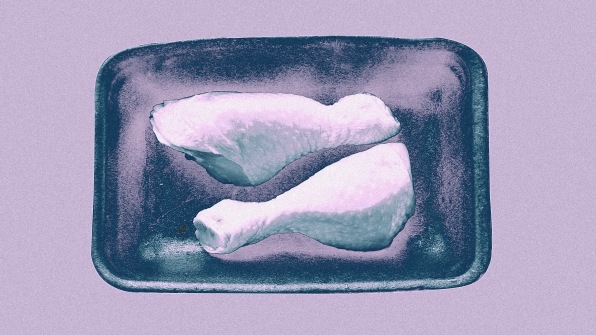American chickens covered in chlorine have become a hot-button Brexit issue in Britain
KFC has just scrapped its “finger lickin’ good” catchphrase—and appetite for cheap American chicken isn’t much better across the pond, where U.S. fowls are ruffling feathers. As a contentious post-Brexit agricultural bill makes its way through British parliament, the country has fixated on the possibility of importing U.S. chickens, raised in such unhygienic conditions that they have to be washed in chlorine before they’re sold to consumers. Will Brits be forced to eat chlorinated U.S. chicken? It’s a question that’s dividing the nation.
Agriculture Bill 2019-21 came into existence as Britain continues to find new trading partners after it exited the European Union. Because of Brexit, the island has had to leave the EU’s Common Agricultural Policy, which sets relatively high standards for animal welfare as a key stipulation for European farmers to receive income support from the government. The EU makes these direct payments to farmers to ensure Europe’s food security by making farming a worthwhile industry (farmers make 40% less than workers in non-agricultural sectors).
As an alternative to the EU, Britain has looked into increasing trade with the U.S., an endeavor welcomed by President Trump, who slavered over “a very big trade deal.” But, the U.S. has a comparative lack of welfare standards, and uses an array of hormones, antibiotics, and chemicals—such as chlorine washes for chicken. British MPs defeated an amendment, by 337 votes to 251, that aimed to protect hygiene and welfare standards as part of a framework for post-Brexit deals.
That’s worrying U.K. farmers and consumers. A poll from May reported that 73% of Britons are more concerned with keeping current welfare and food quality standards, versus 7% who prioritize a trade deal with the U.S. And it’s chicken treated with a chlorine wash that’s become the symbol of the debate over food and farming standards. Back in 2017, during early post-Brexit negotiations, former trade secretary Liam Fox said the British media was “obsessed” with chlorinated chicken, which began to gain outsize coverage in the trade discourse. (In response, a pro-EU group dared Fox to eat a chlorine-washed chicken live on camera.)

In the same poll, 70% of Brits expressed worry about consuming meat treated with chemicals like chlorine. Woody Johnson, the American ambassador to Britain, and heir to the Johnson & Johnson fortune, has brushed these concerns off as political protectionism. “The EU approach prizes history and tradition over innovation and science,” Johnson wrote in The Telegraph, accusing the bloc of being trapped in a “museum of agriculture.” “In the United States, we look at the bigger picture.”
The concern has prompted advocacy from prominent figures. Celebrity chef Jamie Oliver wrote a letter to Prime Minister Boris Johnson, warning: “We could be about to open the floodgates to a whole raft of low-quality food that would normally be illegal in the U.K. Chlorinated chicken is just the tip of the iceberg. We’re talking about genetically modified food, stuffing animals full of hormones and antibiotics, banned pesticides that kill our bees, and an avalanche of foods that are high in fat, salt and sugar.” Oliver encouraged British voters to sign a relevant petition from the National Farmers Union. It has received 1,044,916 signatures at the time of writing.
What is chlorinated chicken, and why is it controversial?
Chlorinated chicken has been illegal in the EU since 1997, but is completely legal in the U.S. In about 10% of U.S. chicken plants, according to the National Chicken Council, chickens are washed in an antimicrobial chlorine rinse after being slaughtered, with the intention of cleaning harmful bacteria, principally campylobacter and salmonella, from the carcasses.
That decontamination process is a quick sanitary fix for the unhygienic conditions under which many U.S. chicken plants function. In some of these factories, entire flocks of chickens will live their entire lives on a bed of fecal matter from thousands of chickens, says Lauri Torgerson-White, research director at Farm Sanctuary, a U.S.-based organization founded to “combat the abuses of factory farming.”
A major concern is the risk of foodborne illness, which stems not directly from the chlorination, rather from unsanitary practices against which the chlorine wash tries to protect. A 2018 study from the University of Southampton, which focused on chlorine treatments on spinach, showed the ineffectiveness of these rinses. Led by microbiology professor Bill Keevil, the team sprayed listeria- and salmonella-infected leaves with chlorine, which did not kill all the pathogens, even though they would likely go undetected by industrial inspections. In his summary, Keevil specifically mentioned the carryover to chicken. “The sanitization does not kill any bacterial pathogens present that are still capable of causing disease,” he wrote. “One example is chlorine-treated chicken carcasses.”
Food poisoning rates in the U.S. are substantially higher than in the U.K. Using a 2015 report from the U.K.’s Food Standard’s Agency, and a 2018 CDC report, it’s estimated that 1,560 per 100,000 Brits contract foodborne illnesses every year, compared to 14,670 per 100,000 Americans.
The sickness isn’t attributed to the chlorine directly, but the chemical is a sign of unsanitary farm or factory conditions, which produce the bacteria that the chlorine aims to kill. The Adam Smith Institute, a British free-market think tank that supports a new trade deal, says that illness claims are blown out of proportion, and that “adults would need to eat 5% of their body weight in chlorinated chicken each day to be at risk of ill health from poultry alone” (which it calculates at three whole chickens daily). But advocates say the problem extends beyond disease, to animal welfare. Tight restrictions encourage better sanitation across the supply chain, meaning more hygienic conditions for animals.
The bill is currently under consideration in the House of Lords. In the meantime, the British Poultry Council has come out against the bill, also driven by concerns that the relative cheapness of chlorine-washed chicken may undercut British farmers. And several of the U.K.’s biggest supermarkets, including Waitrose, Tesco, Sainsbury’s, and Aldi, have banded together in pledging not to stock chlorinated chicken or hormone-injected beef.
The British debate has exposed the lack of the regulations in the U.S., where one of the only two major restrictive laws in the U.S., the Humane Slaughter Act, does not even apply to chickens and turkeys, Torgerson-White says. “I think U.K. consumers have come to expect a certain level of husbandry standards,” she says. “And if they’re importing meat from the U.S., all those standards that have been put in place over the past several decades [are] all thrown out the window.”
Fast Company , Read Full Story
(27)



